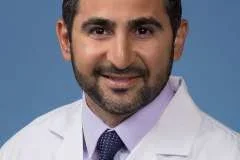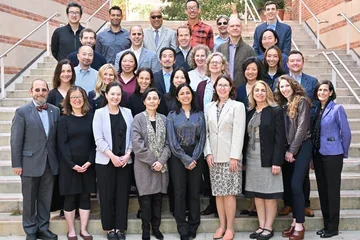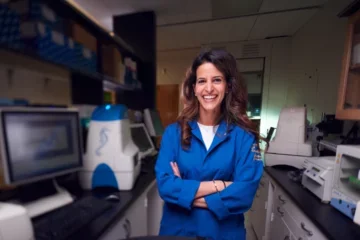What Does a Fertility Doctor Do?
A UCLA Doctor Explains

A Day in the Life of Dr. Zain Al-Safi, UCLA Fertility Specialist
When he started medical school in his native Iraq, Zain Al-Safi, MD, quickly decided that his professional future lay somewhere in the realm of obstetrics-gynecology. "I had a great passion for women's health from my earliest days of training," he says. "I know many couples suffering from infertility and wanted to be able to help people like them as a fertility specialist."
What Is a Fertility Doctor Called?

Today, Dr. Al-Safi specializes in reproductive endocrinology and infertility (REI), a surgical subspecialty of obstetrics and gynecology, at the Fertility and Reproductive Health Center at UCLA. REI specialists complete an ob-gyn residency, followed by a three-year fellowship in REI. He says that, like many of his peers, he was drawn to what he calls an ideal blend of medicine and surgery. "Some other specialties are purely medical, and some are purely surgical, but in REI we get to develop both interests," he notes.
He was also intrigued by how swiftly the field is evolving. "Ovarian stimulation protocols are becoming better, which means we can obtain more mature eggs from each cycle," he explains. "Egg quality is getting better due to improvements in lab techniques and embryo incubation. When I was in residency in 2012, egg freezing was considered experimental. Now it's already the standard of care."
A Blend of Medicine and Surgery
So, what does a fertility specialist do in a typical day? Dr. Al-Safi estimates that he spends 60 percent of his time in patient visits, 20 percent performing ultrasounds and 20 percent in surgery.
Most days, he starts in clinic by 7 or 7:30 am, performing ultrasounds on patients who are undergoing in vitro fertilization (IVF) to monitor their ovarian response to clomiphene or other ovary-stimulating drugs. Patient visits begin around 9 am, when he assesses new patients, which includes taking a medical history and performing a physical exam and baseline ultrasound to gauge ovarian function. He also sees existing patients to discuss treatment options and plan for their next menstrual cycle, continuing in clinic until 4 or 5 pm.
His surgical schedule includes time in the operating room, where he performs hysteroscopy, laparoscopy and open procedures, and in an IVF center, where he retrieves eggs and transfers embryos.
(What Is a Gynecologist? Click to the link to learn more...)
On Call and Oncofertility
Dr. Al-Safi is always on call for his patients, though he points out that reproductive emergencies are rare. And, as one of four REI specialists at the clinic, he must cover every fourth weekend. "The clinic must be open every day of the week due to the sensitivity of timing between ovulation and fertilization."
Dr. Al-Safi also enjoys helping women preserve their fertility after being diagnosed with cancer. "These patients are about to undergo surgery, chemotherapy or radiation, so we work with the oncologists on fertility preservation before cancer treatment can begin," he says. "We can now offer egg cryopreservation, embryo cryopreservation and experimental procedures like in vitro maturation, in which we aspirate eggs to mature them in the lab, so patients won't have to delay treatment waiting for ovarian stimulation."
The Improvements to Come
According to Dr. Al-Safi, REI is a satisfying field. "Once you work with a couple and they achieve their goal of conception, it's extremely rewarding," he says. "But as quickly as REI is advancing, it's frustrating that our success rate is relatively low despite aggressive techniques."
With ovarian stimulation with or without intrauterine insemination, the success rate is 7 to 10 percent per cycle, he says. With IVF, the pregnancy rates rise to about 40 percent per cycle. "These success rates are much higher than in the past," he says, "but we're eager for more improvements."



